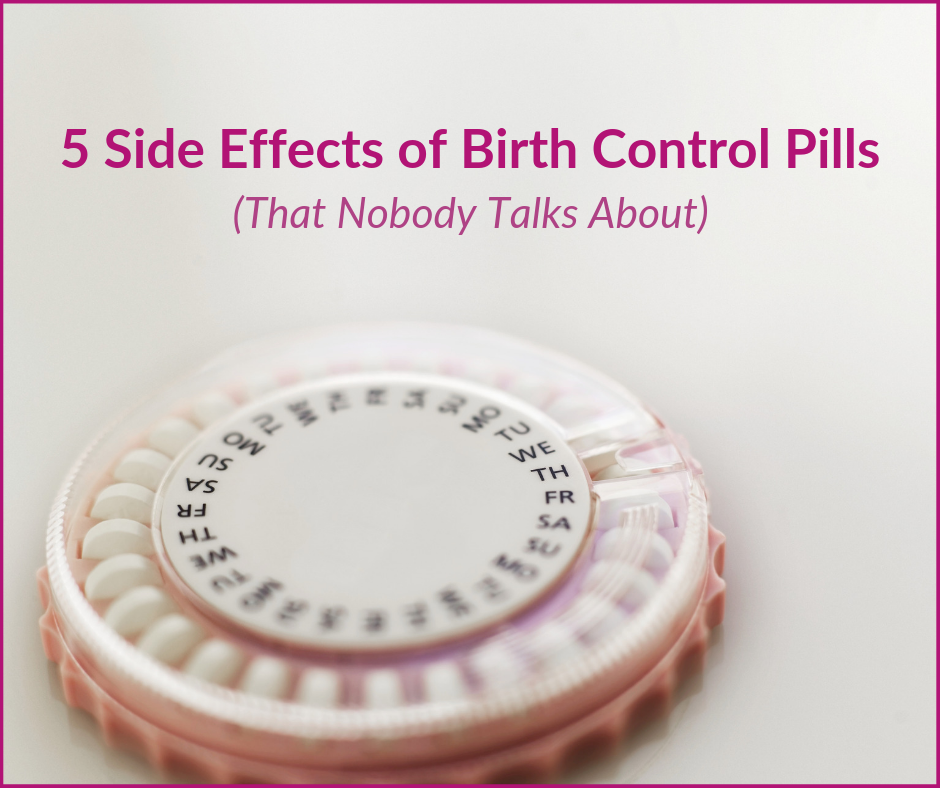I recently read a book by Lisa Hendrickson-Jack titled The Fifth Vital Sign. In her book she talks about how a woman’s menstrual cycle is her fifth vital sign. She goes on to explain how a woman can master her menstrual cycle naturally and use it to both optimize fertility, and avoid unwanted pregnancy, without relying on hormonal contraceptives. In addition she also outlined various side effects of birth control pills that doctors typically don’t warn women about. I’ve listed a summary below and encourage all women to read her book.
5 Side Effects of Birth Control Pills
(That Nobody Talks About)
1. Increases Risk of Mood Disorders
Numerous studies show a link between hormonal contraceptives and depression. In particular, one study indicated that adolescent girls aged 15-19 were 2 to 3 times more likely to be taking an antidepressant. While more research needs to be done as to why that is, one clear link could be that hormonal contraceptives deplete a woman’s vitamin stores. Specifically, birth control pills deplete vitamin B6. Vitamin B6 is necessary to metabolize tryptophan, which is the precursor of serotonin. Coincidentally, low levels of serotonin have been shown to contribute to symptoms like depression and anxiety. Therefore, women who use birth control pills are at an increased risk of mood disorders and depression.
2. Increases Risk of Breast Cancer
Studies show that women who use hormonal contraceptives are more likely to develop both breast and cervical cancer. While researchers aren’t clear as to why this happens, the risk also increases the longer a woman uses hormonal birth control methods. Women who have stopped using hormonal contraceptives, may still have an increased risk of these cancers for up to ten years after discontinued use. If cancer prevention is something a woman is concerned about, birth control pills should be used with extreme caution.
3. Reduces Libido
A healthy sex drive is an indicator of overall health. Unfortunately birth control pills often lower libido. That’s because hormonal contraceptives reduce free testosterone levels by 61% (on average). While women don’t need as much testosterone as men, they still need it. Testosterone plays an important role in their sexual desire and sexual gratification.
In addition to lowering testosterone, birth control pills also increase the level of sex hormone-binding globulin (SHBG). SHBG binds to testosterone and makes it unusable. Studies show that SHBG levels stay elevated for up to a year after a woman has gotten off the pill. Which means birth control pills have the potential to lower libido for up to a full year after a woman stops taking it.
4. Decreases Ability to Orgasm
Birth control pills will literally shrink the size of a woman’s vulvar tissues. Vulvar tissues include the clitoris, labia minora, and vaginal opening. While this might not sound like a big deal, a woman’s vulvar tissues are a certain size for a reason. When these tissues shrink women often find that sex becomes painful and that it is harder to orgasm.
5. Interferes With Mate Selection
When a female approaches ovulation, she naturally prefers certain men based on how they smell. The scientific name for this process is Major Histocompatibility Complex (MHC). MHC will also influence the way a female smells to men. This means that partners who are a good genetic match are naturally drawn to each other based on how they smell.
Unfortunately birth control pills interfere with this process and ultimately a woman’s selection of her mate. Interestingly enough, a woman’s choice of mate and their genetic compatibility also impacts the couple’s fertility. So women who met their partners while on the pill may notice a decrease in attraction to their partner, and less fertility with that partner, once she gets off of it.
Many women accept the side effects of birth control pills as part of managing their periods and avoiding pregnancy. However, dealing with the side effects of birth control pills is completely unnecessary.
Not only are there many ways to avoid pregnancy without hormonal contraception, but women can use natural methods to overcome PMS symptoms and hormonal imbalances. Working with a Naturopath is a great way to learn more and get started in this process.







